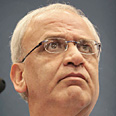The disagreement emerged a day before Olmert and Palestinian President Mahmoud Abbas were scheduled to meet for the latest in a series of US-backed talks aimed at reaching a peace deal by the end of the year.
Also Monday, Israel agreed to allow a rare shipment of cement into the Gaza Strip. Officials said the material would be used to build a desperately needed sewage treatment plant to replace one that collapsed last year and killed five people. Israel has blocked cement shipments to Gaza as part of a broader blockade after last June's takeover by Hamas.
In a speech Sunday, Olmert said he and Abbas have agreed to make Jerusalem the last item on the negotiating agenda because it is "the most difficult" issue. Olmert also hinted the sides may not be able to complete a full agreement in time, saying a possibility is that the negotiations may only yield a more vague declaration or "principles."
Palestinian negotiator Saeb Erekat rejected those ideas Monday. "The most important thing for us now is to find a solution for all these issues, and it will be an agreement," Erekat said. "Core issues are inseparable," Erekat added. "They are all one package, and there is no such agreement to exclude or delay any of them."
The matter of Jerusalem is key for Olmert, since a coalition partner, the Orthodox Jewish Shas Party, has
threatened to withdraw from the government if Jerusalem is brought up in the talks.
Erekat said Tuesday's meeting was not expected to deal with the final-status issues. Instead, he expected the talks to focus on day-to-day areas of concern, such as Israeli construction in the West Bank and east Jerusalem and Palestinian rocket attacks on southern Israel from the Hamas-controlled Gaza Strip.
Palestinian Information Minister Riad Malki said Abbas would also try to stave off an Israeli invasion of Gaza. Israel has maintained a tight blockade of the area, allowing little more than humanitarian supplies inside.
Gaza sewage plant
The sewage treatment plant, being built by the World Bank, had been an exception to the Israeli restrictions. But last month, Israel blocked the entrance of supplies for the plant as well, following an escalation of rocket attacks on Israeli border towns by Gaza militants.
The project is one of the first successes of the international Mideast envoy Tony Blair. The former British prime minister, who was appointed by the "Quartet" of Mideast mediators last summer, is trying to bolster the Palestinian economy as part of international efforts to lay the groundwork for a future state.
Defense Minister Ehud Barak agreed to allow the shipment of cement to Gaza in a meeting Sunday with French Foreign Minister Bernard Kouchner, officials from Barak's office said. They spoke on condition of anonymity because they were not authorized to discuss the matter with reporters.
The project is meant to replace a dilapidated plant in northern Gaza where sewage pools collapsed last year, killing five people. The Palestinian supervisor of the project, Sadi Ali, said Monday that he thought he could finish most of the project by August if cement arrived within two months. This would allow 90 percent of the sewage flowing to the old plant to be redirected to the new facility, Ali said.
The new plant is being built in an unpopulated area near the Israeli border with money from international donors through a contract signed between the World Bank and Abbas' government in the West Bank. It would serve much of the northern Gaza Strip together with an existing plant near Gaza City. Sewage in the southern Gaza Strip is not treated and flows into the Mediterranean Sea.
During recent power outages - caused in part by Israeli sanctions - the treatment plants had to be shut down, and that sewage also flowed into the sea.

















